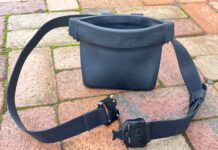When most of us hear about animal caught in natural disasters, we sigh and fret – and then move on. One close friend of Whole Dog Journal has done more.
Rain has been falling relentlessly in Thailand since July, and many parts of the country are experiencing the worst flooding reported since World War II. Bangkok, the capital and the most densely populated city in the country (with more than 9 million residents) is suffering from particularly severe flooding. This is in part due to the fact that one of Thailand’s major rivers, the Chao Phraya River, flows through the city, and the city sprawls over the plains and river deltas that lead into the Bay of Bangkok. Bangkok, which lies at about 6 feet above sea level, is often referred to as the “Venice of the East,” due to the many canals and water passages found in the city. Of course, with the torrential rain, these waterways are swollen, and many inhabitants — human and otherwise – have nowhere to escape the flooding.
Bangkok is also known as a city with one of the largest populations of stray dogs in the world. It’s been estimated that as many as 300,000 stray dogs roam the city’s streets at any given time. Thailand’s citizens are mostly Buddhists; they don’t believe in killing animals unnecessarily. Dogs are not eaten in Thailand. In fact, the street dogs are often fed by kind-hearted residents.
With the severe flooding, however, and people struggling to keep themselves and their families out of the water, dogs (and cats) are in dire straits. Mass evacuations of people are being carried out by the government, and people are not being permitted to take their pets. News reports show animals on roofs and in trees, and very few volunteers are available to help rescue, house, and care for them. Abandoned animals and permanently homeless animals alike are fending for themselves in the flooded city.
Sandi Thompson, a dog trainer and owner of Bravo!Pup Dog and Puppy Training in Berkeley, California (and frequent model for articles in WDJ), knows what it’s like to be waist-deep in water with no help on the horizon. In December 2004, Thompson was vacationing on a Ko Kho Khao Island resort in southern Thailand when she was caught in the Indian Ocean tsunami that killed an estimated 230,000 people in 14 countries. She and her traveling companion lost all of their possessions, but thanks to their credit cards, were able (over the course of 5 days) to secure spots on boats and buses and eventually make their way back to the mainland and fly home to the U.S. She’s been haunted by the deaths and devastation she witnessed during that ordeal, and admits to suffering post-traumatic stress, particularly when she is exposed to news like that coming out of Thailand right now.
As I said earlier, unlike most of us, Thompson couldn’t just read the articles and move on. She started researching and contacting animal-welfare organizations that help the street dogs, and asking if they needed “boots on the ground” to help in animal rescue operations in Bangkok. She very quickly learned that yes, help would very much be appreciated. As I write this, Thompson is boarding a flight to Thailand, having put her own dog (and training business) in the hands of friends and employees for the next three weeks.
Thompson is volunteering for the Soi Dog Foundation (Soi means “street” or “alley” in the Thai language), an organization that usually focuses on feeding and providing spay/neuter services for the street animals. The Soi Dog Foundation is one of a number of animal welfare groups in the country helping to rescue and evacuate animals in Bangkok. Using boats in the flooded streets, the Foundation has already rescued hundreds of animals and relocated them to a shelter facility outside of the city — and safe from the flood waters.
Thompson’s familiarity with Thailand and her skill with handling dogs and other animals (she’s a regular volunteer at the Oakland Zoo and has worked with a number of animals species there) uniquely qualify her for this rescue effort; she emphasizes that what’s needed the most right now are donations of dog and cat food, cages, crates, leashes, veterinary supplies – and money, so that all of these things can be purchased to help care for the animals until they can be reunited with their owners or new homes can be found for them.
On its website (http://www.soidog.org), the Soi Dog Foundation says, “Soi Dog is working with groups in the Bangkok area to rescue these animals. These groups are not large animal welfare agencies, but rather smaller groups working around the clock to save the dogs and cats before it is too late. Time is running out and they need your help. Your support will go towards rescue, veterinary care, shelter and rehoming for the dogs and cats. Please donate as generously as you can today! Time is of the essence in saving the lives of these animals!”
Many of the dogs rescued by Soi Dog are being taken to a refuge 150 km from Bangkok that is run by the Wildlife Friends of Thailand. It’s Thompson’s understanding that this is where she will be helping handle and care for the rescued dogs. (For more about this group, see http://www.wfft.org.)
We wish Sandi the best of luck in the endeavor, and encourage anyone else who feels called on to help the unfortunate animals of Bangkok to donate what they can to the Soi Dog Foundation, telephone 081-788-4222; info@soidog.org; http://www.soidog.org.
To see a video of some of the relief and rescue efforts already underway, see http://www.youtube.com/watch?feature=player_embedded&v=2Sqi6hplj9k





